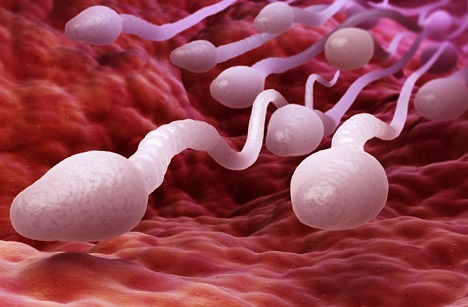Nikhil Prasad Fact checked by:Thailand Medical News Team Dec 12, 2024 4 months, 2 days, 6 hours, 52 minutes ago
Medical News: Male infertility often stems from issues like low sperm motility or vitality, making conception challenging. Probiotics, commonly associated with gut health, have also been identified in the male reproductive system. Their role in improving sperm health, however, remained unclear until now. Researchers from CHA University, Korea, including its Department of Biomedical Science, CHA Fertility Center, and the Institute for Commercialization of Commensals Microbiota, have provided groundbreaking insights into how probiotics can enhance sperm motility. This
Medical News report delves into their findings.
 Probiotics Enhance Sperm Motility Through Mitochondrial Support
Study Overview
Probiotics Enhance Sperm Motility Through Mitochondrial Support
Study Overview
The researchers explored how three specific probiotics - Lacticaseibacillus paracasei, Lacticaseibacillus rhamnosus, and Limosilactobacillus fermentum - affect sperm motility. Mature mouse sperm, extracted from the vas deferens, were treated with these live probiotics. The study aimed to measure their influence on sperm motility, vitality, and mitochondrial function.
This study highlights that the probiotics boosted motility significantly, showing improvements of 30–40% compared to untreated sperm. The researchers attribute this enhancement to the activation of mitochondrial pathways and specific biochemical markers.
Key Findings
The researchers discovered that only live probiotics impacted sperm motility. Treatments with dead or lysed probiotics yielded no improvement, underscoring the importance of viable bacterial cells. Key results included:
-Increased Motility and Vitality: Sperm treated with the probiotics displayed enhanced motility across all tested concentrations. The maximum improvement was observed when live Lacticaseibacillus rhamnosus was used, leading to a 70% increase in motility compared to untreated samples.
-Mitochondrial Activation: The probiotics improved mitochondrial function by activating specific proteins such as AMPK and SIRT1. These proteins are crucial for energy production and motility in sperm.
-Enhanced Tyrosine Phosphorylation: A critical biochemical marker, tyrosine phosphorylation in sperm tails, was elevated by 10-20% in sperm treated with Lacticaseibacillus paracasei. This increase directly correlated with enhanced motility.
-AMPK Phosphorylation: The activation of AMPK by the probiotics reduced mTOR phosphorylation, ensuring efficient mitochondrial activity and energy use.
Understanding the Mechanisms
Sperm motility depends heavily on energy generated by mitochondria. Probiotics appear to activate pathways that optimize mitochondrial function, leading to improved motility. Specifically:
-AMPK Activation: This enzyme plays a vital role in cellular energy regulation and mitochondrial activity. By activ
ating AMPK, probiotics help maintain the energy supply needed for sperm movement.
-SIRT1 Influence: This protein supports mitochondrial function and exhibits antioxidant properties. Its increased levels in treated sperm further protect against oxidative stress and enhance energy metabolism.
-Reduced mTOR Activity: The balance between AMPK and mTOR is essential for efficient mitochondrial function. Probiotics optimize this balance, promoting sperm health.
Practical Implications
The findings suggest that probiotic treatments could offer a non-invasive option to support male fertility. By enhancing mitochondrial function and energy production, probiotics might address issues related to low sperm motility, a common cause of infertility.
Conclusions
The research concludes that probiotics like Lacticaseibacillus paracasei, Lacticaseibacillus rhamnosus, and Limosilactobacillus fermentum have the potential to revolutionize treatments for male infertility. By improving mitochondrial function, these probiotics not only enhance sperm motility but also protect against mitochondrial dysfunction. This dual benefit makes them a promising avenue for future fertility treatments.
Future studies should focus on understanding the specific metabolites within probiotics responsible for these benefits. Additionally, researchers must explore whether these findings apply to human sperm and how they might be integrated into clinical practice.
The study findings were published in the peer-reviewed International Journal of Molecular Sciences.
https://www.mdpi.com/1422-0067/25/23/13220
For the latest on Male Fertility, keep on logging to Thailand
Medical News.
Read Also:
https://www.thailandmedical.news/news/probiotics-as-a-potential-ally-in-managing-covid-19-gastrointestinal-symptoms
https://www.thailandmedical.news/news/south-african-authorities-warn-of-a--clausii-blood-infection-linked-to-sanofi-s-enterogermina-probiotic
https://www.thailandmedical.news/news/probiotic-lactobacillus-rhamnosus-for-weight-control
https://www.thailandmedical.news/news/the-anti-inflammatory-power-of-probiotic-lactiplantibacillus-plantarum-z22-found-in-fermented-vegetables
https://www.thailandmedical.news/news/south-korean-study-finds-that-lacticaseibacillus-rhamnosus-hdb1258-boosts-immunity-and-improves-gut-health
https://www.thailandmedical.news/news/thailand-medical-researchers-find-that-the-probiotic-limosilactobacillus-reuteri-reduces-uti-bacteria-and-enhances-immunity
